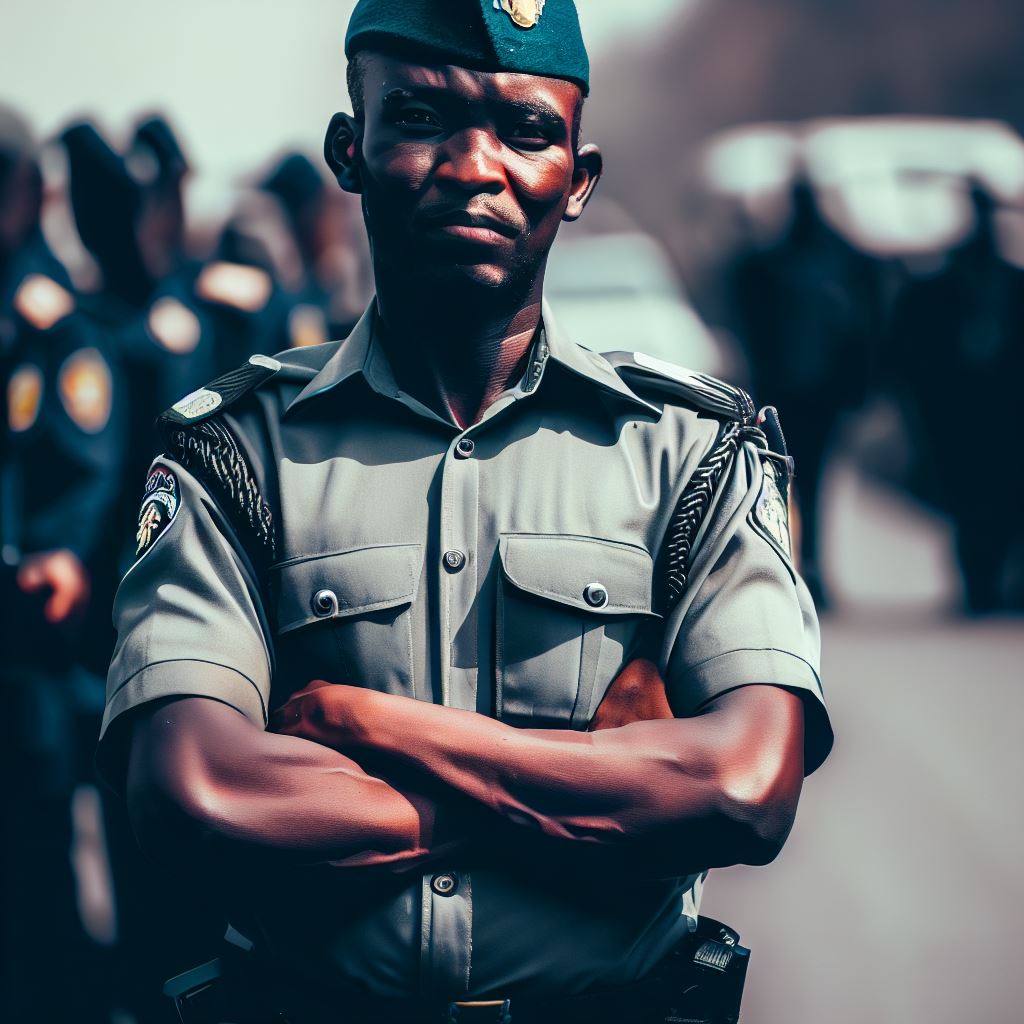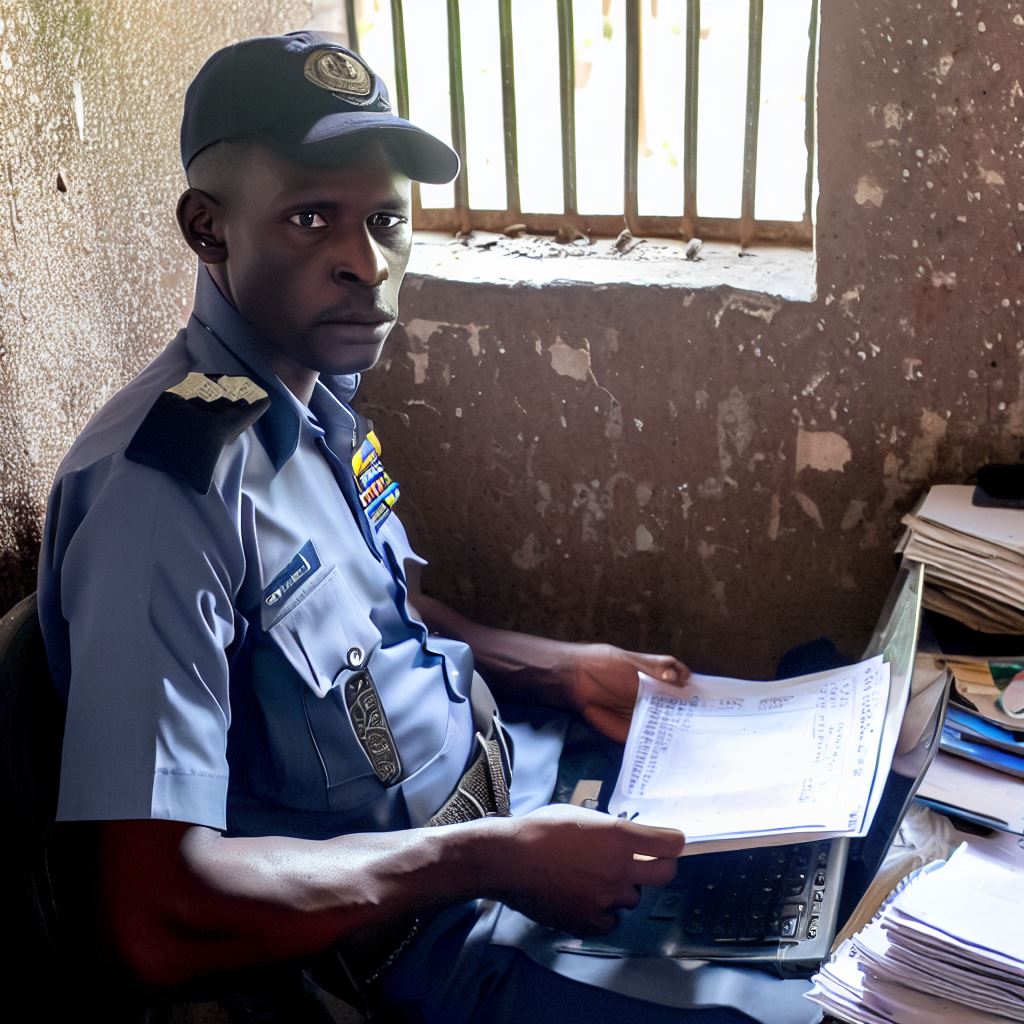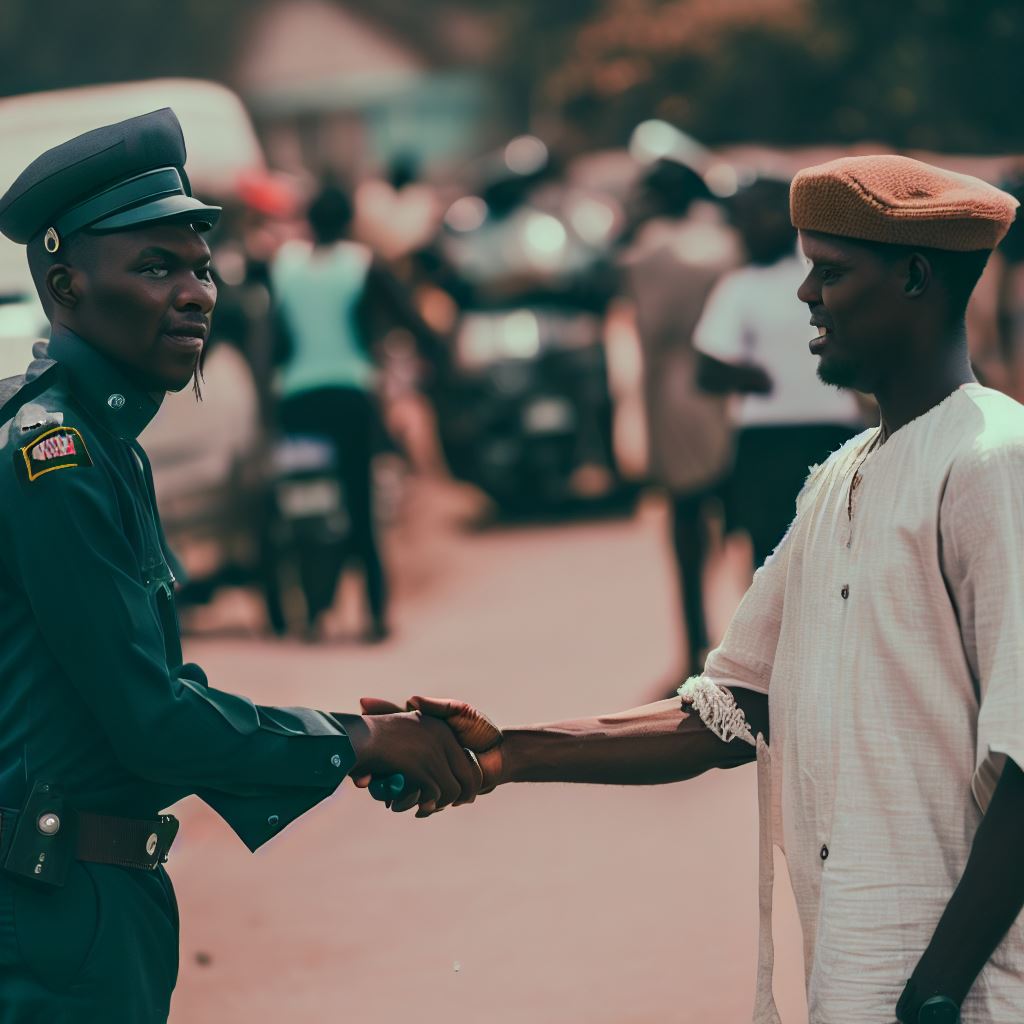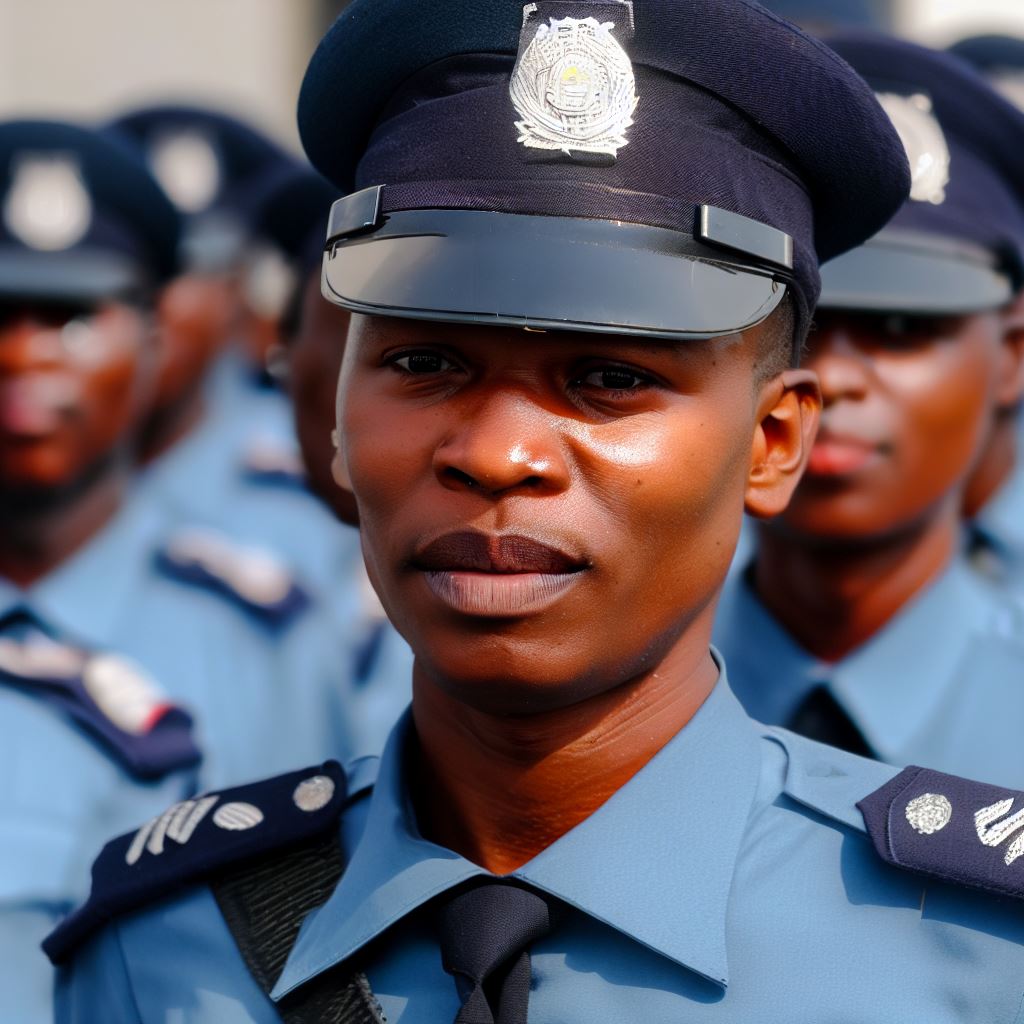Introduction
Police accountability is crucial for upholding human rights and maintaining public trust in law enforcement. It ensures that police officers act within the law and are held responsible for their actions.
Human rights, such as the right to life, liberty, and security, must be protected by the police.
In Nigeria, there have been numerous reports of police misconduct, abuse of power, and violations of human rights.
Cases of extrajudicial killings, torture, extortion, and harassment by the police have sparked public outrage. The Special Anti-Robbery Squad (SARS) has become notorious for its brutal tactics.
The purpose of this blog post is to shed light on the current state of police accountability and human rights in Nigeria.
It aims to raise awareness about the urgent need for reforms within the Nigerian police force. By advocating for accountability and human rights, we can contribute to a safer and more just society.
Key Issues Surrounding Police Accountability in Nigeria
Widespread reports of police misconduct and abuse of power
- Police in Nigeria often use excessive force in their interactions with the public.
- Arbitrary arrests and detentions have become common practices among Nigerian police officers.
- Extrajudicial killings committed by the police have been frequently reported.
Lack of effective mechanisms for holding police officers accountable
- Internal accountability procedures within the police force are weak and ineffective.
- The external oversight and complaint mechanisms for police misconduct are limited in their effectiveness.
- There is a lack of accountability and impunity for human rights violations committed by the police.
In Nigeria, the issue of police accountability and human rights violations has become a significant concern.
A number of key issues surround the topic, highlighting the urgent need for reforms in the Nigerian police system.
One of the most prominent issues is the widespread reports of police misconduct and abuse of power. Nigerian police officers are frequently known to use excessive force when dealing with the public.
This excessive force often leads to unnecessary injuries and even deaths. Such use of force directly violates the human rights of Nigerian citizens and undermines the trust and confidence in the police force.
This practice not only infringes upon the fundamental rights of the citizens but also undermines the principles of justice and fairness.
Extrajudicial killings committed by the police further compound the issue of police accountability in Nigeria.
Numerous cases have been reported where police officers have unlawfully taken the lives of individuals without any legal proceedings.
These extrajudicial killings blatantly violate the right to life and highlight the dire need for mechanisms to hold the police accountable for their actions.
Nevertheless, the lack of effective mechanisms for holding police officers accountable exacerbates the problem.
Internal accountability procedures within the police force are weak and often fail to address acts of misconduct.
This lack of internal accountability allows police officers to act with impunity, knowing that their actions are unlikely to be properly investigated or punished.
Read: Becoming a Police Officer in Nigeria: Qualifications Needed
Impacts of Police Misconduct on Human Rights
Violations of the right to life, liberty, and security
- Excessive force by the police leads to unnecessary loss of life.
- Arbitrary arrests and detentions infringe upon individuals’ rights to liberty.
- Unlawful raids and searches violate citizens’ right to security in their homes.
Limitations on freedom of expression and peaceful assembly
- Police intimidation and harassment discourage individuals from exercising their right to free speech.
- Disruption and suppression of peaceful protests undermine the right to peaceful assembly.
- Detention of activists and journalists silences dissenting voices and suppresses freedom of expression.
Challenges to the right to a fair trial and due process
- Torture, coercion, and forced confessions compromise the right to a fair trial.
- Corruption within the police force undermines the integrity of the criminal justice system.
- Protracted delays in trials deny individuals their right to a timely and impartial hearing.
Psychological and emotional impact on victims and communities
- Brutality and abuse by the police traumatize individuals and erode their sense of security.
- The fear of reprisals and violence from law enforcement creates a climate of fear in communities.
- Communities suffer from a loss of trust and cooperation with the police, hindering crime prevention efforts.
In Nigeria, police misconduct has significant consequences on human rights. Violations of the right to life, liberty, and security are all too common.
Excessive force by the police often leads to unnecessary loss of life, while arbitrary arrests and detentions infringe upon individuals’ rights to liberty.
Unlawful raids and searches further violate citizens’ right to security in their own homes.
Police misconduct in Nigeria limits freedom of expression and peaceful assembly by intimidating and harassing individuals, discouraging free speech.
The disruption and suppression of peaceful protests undermine the right to peaceful assembly.
Authorities frequently target and detain activists and journalists, effectively silencing dissent and suppressing freedom of expression.
Furthermore, police misconduct poses significant challenges to the right to a fair trial and due process. Through the use of torture, coercion, and forced confessions, individuals are denied their right to a fair trial.
Corruption within the police force further undermines the integrity of the criminal justice system. Protracted delays in trials also deny individuals their right to a timely and impartial hearing.
Finally, the psychological and emotional impact of police misconduct on victims and communities cannot be overlooked.
The brutality and abuse suffered by individuals at the hands of the police often traumatize them and erode their sense of security.
The fear of reprisals and violence from law enforcement creates a climate of fear in communities, affecting the overall well-being of society.
Read: Nigeria Police Force: Equipment and Technological Tools
Efforts and Initiatives for Police Accountability in Nigeria
Various stakeholders, including the government, civil society organizations, and international actors, have actively promoted police accountability and human rights protection in Nigeria.
These initiatives aim to address the longstanding issues of police brutality, corruption, and impunity in the country.
Government reforms and institutional changes
The Nigerian government has implemented several reforms and institutional changes to enhance police accountability.
This includes the creation of special units and task forces within the police force to handle specific cases of misconduct, such as the Special Anti-Robbery Squad (SARS).
Additionally, training programs and capacity-building initiatives have been introduced to ensure the professionalism and adherence to human rights standards among police officers.
Legislative reforms have also been pursued to strengthen and improve accountability mechanisms within the police force.
Civil society organizations and advocacy groups fighting for accountability
Civil society organizations, human rights organizations, and activists play a crucial role in advocating for police accountability in Nigeria.
They monitor police activities, document cases of abuse, and provide support to victims.
These organizations also engage in awareness campaigns and public mobilization efforts to raise consciousness about police misconduct and demand accountability from the authorities.
Their work contributes to the creation of public pressure for meaningful reforms.
International interventions and support
The international community has been involved in supporting initiatives for police accountability in Nigeria. International human rights organizations collaborate with local groups to share expertise and best practices.
They provide technical assistance and funding for reform projects, aiming to strengthen accountability mechanisms and promote human rights standards within the Nigerian police force.
Through these partnerships, international actors help amplify the voices of Nigerian activists and facilitate the implementation of effective reforms.
Addressing police accountability and protecting human rights in Nigeria requires collaborative efforts from various stakeholders.
Government reforms and institutional changes, civil society engagement and advocacy, as well as international support, are essential components in achieving lasting change.
By working together, Nigeria can move towards a more accountable and rights-respecting policing system.
Read: The Fight Against Corruption within the Nigerian Police

Learn More: Leadership Skills: Being an Officer in Nigeria’s Army
Challenges and Limitations to Achieving Police Accountability in Nigeria
Inadequate funding and resources
- The Nigerian police force suffers from a lack of adequate funding for training and equipment.
- Insufficient resources result in compromised investigations and hinder the effectiveness of police operations.
- Without proper funding, police officers may be more susceptible to corruption or bribery.
Corruption and lack of political will
- Corruption within the Nigerian police force is a significant obstacle to achieving accountability.
- Scandals involving bribery, extortion, and abuse of power erode public trust and undermine the justice system.
- Lack of political will to tackle corruption allows perpetrators to go unpunished, perpetuating a culture of impunity.
Deep-rooted systemic issues within the Nigerian police force
- The Nigerian police force grapples with organizational and structural challenges that impede accountability.
- Inadequate training and education lead to a lack of professionalism and knowledge of human rights.
- Hierarchical structures and centralized decision-making hinder transparency and hinder effective oversight.
Limited public trust and fear of reprisals
- Widespread public mistrust of the police undermines efforts to establish accountability mechanisms.
- Fear of reprisals and retaliation discourages civilians from reporting abuses or holding officers accountable.
- Rebuilding public trust requires significant improvements in police conduct and punitive measures for misconduct.
Capacity gaps and weaknesses in the justice system
- The Nigerian justice system faces capacity gaps, including a backlog of cases and insufficient legal expertise.
- Inadequate training for judges and lawyers contributes to delays and compromises fair trials.
- Insufficient coordination between the police, prosecutors, and courts hinders the effective prosecution of offenders.
Addressing these challenges and limitations is crucial for establishing a culture of police accountability in Nigeria.
Adequate funding must be allocated to improve training and provide the necessary resources for effective policing.
Political leaders must demonstrate a strong commitment to combating corruption within the police force and hold offenders accountable.
Additionally, systemic issues should be addressed through comprehensive reforms, including improved training programs and restructuring of hierarchical structures.
Building public trust requires fostering open dialogue, introducing complaint mechanisms, and creating safe spaces for reporting abuses.
Finally, capacity gaps in the justice system should be addressed through investments in infrastructure, training, and coordination between key justice sector stakeholders.
Only by effectively tackling these challenges can Nigeria ensure police accountability and protect human rights.
Read: Women in Nigeria’s Police Force: Roles and Opportunities
The Way Forward: Recommendations for Improving Police Accountability and Human Rights in Nigeria
Both the government and the Nigerian Police Force must actively collaborate to ensure police accountability and human rights respect in Nigeria.
The recommendations outlined below serve as a guide for improving the current situation:
Strengthening legal and institutional frameworks
The Nigerian government should prioritize the development of legislation that clearly defines police abuses, including excessive use of force, torture, and corruption, as criminal offenses.
This legislation should also establish appropriate punishments, ensuring that perpetrators are held accountable for their actions.
Additionally, the government should allocate adequate resources to the establishment of specialized courts that handle cases of police abuses.
These courts, along with an adequately funded and skilled prosecutorial body, will help expedite the judicial process and ensure justice for victims.
Enhancing police training and professional standards
Regular and comprehensive human rights training programs should become an integral part of police training curricula at all levels.
This training should focus on promoting respect for human rights, emphasizing the dignity of all individuals, and developing de-escalation techniques in potential conflict situations.
The Nigerian Police Force should also implement mechanisms for oversight and evaluation of police officers’ conduct, ensuring consistent adherence to professional standards and ethical behavior.
Establishing independent oversight bodies
Establish independent oversight bodies, not part of the police force, to actively investigate and resolve complaints against law enforcement.
These bodies should have a mandate to conduct impartial investigations, employ qualified personnel, and have the power to recommend disciplinary actions, including prosecution.
Adequate resources and legal authority must be provided to these oversight bodies to ensure their effectiveness.
Encouraging community engagement and trust-building initiatives
To bridge the gap between the police and the community, it is essential to encourage community engagement and foster trust-building initiatives.
Community policing programs achieve this through active collaboration between police and community members.
Regular town hall meetings, outreach programs, and joint initiatives aimed at addressing local concerns can help foster a mutual understanding and cooperation between the police and the communities they serve.
Promoting and protecting the rights of victims
Victims of police abuses often face barriers in accessing justice and support.
To address this, the Nigerian government should establish effective witness protection programs, ensuring the safety of those who come forward to report police misconduct.
Furthermore, legal aid services should be readily available to victims, providing them with necessary legal representation and assistance throughout the judicial process.
These measures will help promote and protect the rights of victims, enhancing their access to justice.
By implementing these recommendations, Nigeria can take significant steps towards improving police accountability and human rights in the country.
It requires a coordinated effort between the government, the Nigerian Police Force, and civil society to bring about the necessary changes.
Accountability and respect for human rights are at the core of a just and thriving society, and Nigeria has the opportunity to make meaningful progress in this regard.
Conclusion
In this blog post, we highlighted the issues surrounding police accountability and human rights in Nigeria. We discussed the challenges faced by citizens due to police misconduct and the violation of their rights.
We also examined the various factors contributing to the lack of police accountability, including corruption, inadequate training, and weak institutional frameworks.
It is imperative for all stakeholders, including the government, law enforcement agencies, civil society organizations, and the citizens, to come together and prioritize police accountability.
We need to push for reforms that promote transparency, professionalism, and adherence to human rights standards within the police force.
Despite the challenges, there is hope for a better future in Nigeria, where the police force operates with integrity, respect for human rights, and accountability.
By working towards stronger checks and balances, effective oversight mechanisms, and comprehensive training programs, we can ensure that the police force serves and protects the citizens.
To achieve this, it is crucial for citizens to stay informed, actively engage with advocacy groups, and demand accountability from their law enforcement agencies.
We can build a society where the police respect everyone’s rights, ensuring safety and protection for all.




